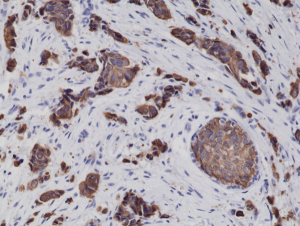anti-Cytokeratin-8 (human) Rabbit Monoclonal (RM266)
| Code | Size | Price |
|---|
| REV-31-1148-00-R100 | 100 ul | £455.00 |
Quantity:
Prices exclude any Taxes / VAT
Overview
Antibody Isotype: Rabbit IgG
Antibody Clonality: Recombinant Antibody
Antibody Clone: RM266
Regulatory Status: RUO
Target Species: Human
Applications:
- Immunohistochemistry (IHC)
- Western Blot (WB)
Shipping:
Blue Ice
Storage:
+4°C
Images
Documents
Further Information
Alternate Names/Synonyms:
CK8; Cytokeratin 8; CK-8; Keratin-8; Type-II Keratin Kb8
Concentration:
N/A
EClass:
32160000
Form (Short):
liquid
Formulation:
Liquid. 50% Glycerol/PBS with 1% BSA and 0.09% sodium azide.
Handling Advice:
Avoid freeze/thaw cycles.
Immunogen:
A peptide corresponding to the C-terminus of human Cytokeratin-8.
Long Description:
Recombinant Antibody. This antibody reacts to human CK8 (Cytokeratin-8). Applications: WB, IHC. Source: Rabbit. Liquid. 50% Glycerol/PBS with 1% BSA and 0.09% sodium azide. Cytokeratins are keratin proteins found in the intracytoplasmic cytoskeleton of epithelial tissue (at least 20 different polypeptides). They are an important component of intermediate filaments, which help cells resist mechanical stress. Expression of these cytokeratins within epithelial cells is largely specific to particular organs or tissues. The subsets of cytokeratins which an epithelial cell expresses depends mainly on the type of epithelium, the moment in the course of terminal differentiation and the stage of development. Thus a specific cytokeratin expression profile allows the identification of epithelial cells. Furthermore, this applies also to the malignant counterparts of the epithelia, (carcinomas). Cytokeratin subtype expression patterns are used to an increasing extent in the distinction of different types of epithelial malignancies. The cytokeratin antibodies are not only of assistance in the differential diagnosis of tumors using immunohistochemistry on tissue sections, but are also a useful tool in cytopathology and flow cytometric assays. Cytokeratin-8 is a member of the type II (basic or neutral) cytokeratin family. Type II keratins, in general, are heteropolymeric structural proteins coexpressed during differentiation of simple and stratified epithelial tissues. Cytokeratin-8 typically dimerizes with cytokeratin-18 to form an intermediate filament in simple single-layered epithelial cells. This protein plays a role in maintaining cellular structural integrity and also functions in signal transduction and cellular differentiation. Mutations in this gene cause cryptogenic cirrhosis. In combination cytokeratin-8 and cytokeratin-18 are used in immunohistochemistry to demonstrate certain forms of cancer. In normal tissue, it reacts mainly with secretory epithelia, but not with squamous epithelium. It is considered useful in identifying microscopic metastases of breast carcinoma in lymph nodes, and in distinguishing Paget's disease from malignant melanoma.
NCBI, Uniprot Number:
P05787
Package Type:
Vial
Product Description:
Cytokeratins are keratin proteins found in the intracytoplasmic cytoskeleton of epithelial tissue (at least 20 different polypeptides). They are an important component of intermediate filaments, which help cells resist mechanical stress. Expression of these cytokeratins within epithelial cells is largely specific to particular organs or tissues. The subsets of cytokeratins which an epithelial cell expresses depends mainly on the type of epithelium, the moment in the course of terminal differentiation and the stage of development. Thus a specific cytokeratin expression profile allows the identification of epithelial cells. Furthermore, this applies also to the malignant counterparts of the epithelia, (carcinomas). Cytokeratin subtype expression patterns are used to an increasing extent in the distinction of different types of epithelial malignancies. The cytokeratin antibodies are not only of assistance in the differential diagnosis of tumors using immunohistochemistry on tissue sections, but are also a useful tool in cytopathology and flow cytometric assays. Cytokeratin-8 is a member of the type II (basic or neutral) cytokeratin family. Type II keratins, in general, are heteropolymeric structural proteins coexpressed during differentiation of simple and stratified epithelial tissues. Cytokeratin-8 typically dimerizes with cytokeratin-18 to form an intermediate filament in simple single-layered epithelial cells. This protein plays a role in maintaining cellular structural integrity and also functions in signal transduction and cellular differentiation. Mutations in this gene cause cryptogenic cirrhosis. In combination cytokeratin-8 and cytokeratin-18 are used in immunohistochemistry to demonstrate certain forms of cancer. In normal tissue, it reacts mainly with secretory epithelia, but not with squamous epithelium. It is considered useful in identifying microscopic metastases of breast carcinoma in lymph nodes, and in distinguishing Paget's disease from malignant melanoma.
Purity:
Protein A purified.
Source / Host:
Rabbit
Specificity:
This antibody reacts to human CK8 (Cytokeratin-8).
Transportation:
Non-hazardous
UNSPSC Category:
Primary Antibodies
UNSPSC Number:
12352203
Use & Stability:
Stable for at least 1 year after receipt when stored at -20°C.



